Unit11 How was your school trip Section B 2a---3c
2013_版____Unit_11-_How_was_your_school_trip-Section_B_2a-2c
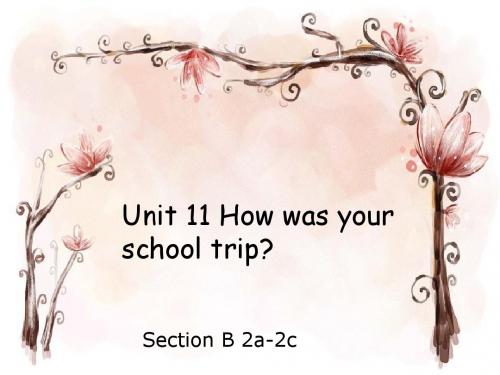
Helen
the trip the train
Jim
exciting
fast
terrible
slow
the museum really interesting big, boring, the gift shop and gifts
dark, too many people
lovely, not expensive
positive [ˈp ɒzətɪv]
attitude
adj. 积极的,肯定的;
[ˈætitju:d] n. 态度,看法;
1. What did Helen visit on the school trip? 2. How did Helen feel about the school trip? 3. How did Helen get to the science museum? 4. What did Helen see along the way?
Read Helen’s diary and answer the following questions.
5. What did Helen learn at the museum?
6. What could robots do with visitors?
7. What did the guide teach them?
8. Did Helen take many photos? 9. What did Helen buy at the gift shop? 10. Who did Helen buy the gifts for?
11. Were the gifts expensive?
June 15th
Unit_11_How_was_your_school_trip_Section_A_2

I. 填入适当的词。 1. She often ____ (go) to the park on goes weekends, but yesterday she went (go) to ____ the zoo. 2. Last week she had (have) fun on a farm. ___ 3. What ___ they __ (do) on the school trip? did do They ____ (ride) horses and _______ rode climbed (climb) the mountains.
3. I was very busy last week. (改否定
句和一般疑问句)
I wasn’t very busy last week. ______ _____ Were you very busy last week? 4. There was some orange in the cup. (变一般疑问句) _____ there ____ orange in the cup? any Was
was 4. How ____ their school trip? It was interesting. ___
___ she go (go) fishing? __ Did Yes, she did. 5. Did Li Ming ____ (pick) any ___ pick
strawberries? No, he didn’t.
Groupwork
Make a survey. Ask your partners what they did last week. Then give a reporter. A: Hi, Carol. What did you do last weekend? B: I watched TV, and then I went fishing with my father. A: How was your last weekend? B: It was boring.
人教版英语七年级下册教案:Unit11 How was your school trip? Section B(3a-Self Check)
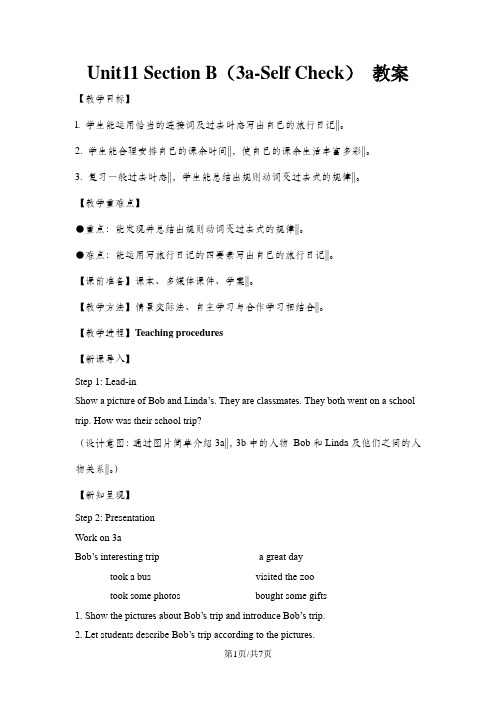
Unit11 Section B(3a-Self Check)教案【教学目标】l. 学生能运用恰当的连接词及过去时态写出自己的旅行日记||。
2. 学生能合理安排自己的课余时间||,使自己的课余生活丰富多彩||。
3. 复习一般过去时态||,学生能总结出规则动词变过去式的规律||。
【教学重难点】●重点:能发现并总结出规则动词变过去式的规律||。
●难点:能运用写旅行日记的四要素写出自己的旅行日记||。
【课前准备】课本、多媒体课件、学案||。
【教学方法】情景交际法、自主学习与合作学习相结合||。
【教学进程】Teaching procedures【新课导入】Step 1: Lead-inShow a picture of Bob and Linda’s. They are classmates. They both went on a school trip. How was their school trip?(设计意图:通过图片简单介绍3a||,3b中的人物Bob和Linda及他们之间的人物关系||。
)【新知呈现】Step 2: PresentationWork on 3aBob’s interesting trip a great daytook a bus visited the zootook some photos bought some gifts1. Show the pictures about Bob’s trip and introduce Bob’s trip.2. Let students describe Bo b’s trip according to the pictures.3. Look at the pictures and complete Bob’s diary.(设计意图:通过图片及一些短语介绍并描述Bob的旅行||,为补全Bob的旅行日记作了铺垫||,同时也降低了难度||,也符合学生的认知规律——由输入到输出||。
新目标版英语七年级下册Unit11Howwasyourschooltrip?(SectionA)含答案
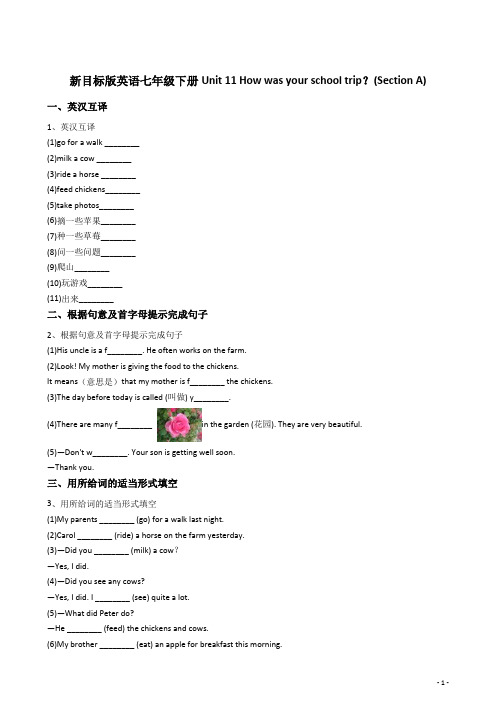
新目标版英语七年级下册Unit 11 How was your school trip?(Section A)一、英汉互译1、英汉互译(1)go for a walk ________(2)milk a cow ________(3)ride a horse ________(4)feed chickens________(5)take photos________(6)摘一些苹果________(7)种一些草莓________(8)问一些问题________(9)爬山________(10)玩游戏________(11)出来________二、根据句意及首字母提示完成句子2、根据句意及首字母提示完成句子(1)His uncle is a f________. He often works on the farm.(2)Look! My mother is giving the food to the chickens.It means(意思是)that my mother is f________ the chickens.(3)The day before today is called (叫做) y________.(4)There are many f________ in the garden (花园). They are very beautiful.(5)—Don't w________. Your son is getting well soon.—Thank you.三、用所给词的适当形式填空3、用所给词的适当形式填空(1)My parents ________ (go) for a walk last night.(2)Carol ________ (ride) a horse on the farm yesterday.(3)—Did you ________ (milk) a cow?—Yes, I did.(4)—Did you see any cows?—Yes, I did. I ________ (see) quite a lot.(5)—What did Peter do?—He ________ (feed) the chickens and cows.(6)My brother ________ (eat) an apple for breakfast this morning.(7)John ________ (study) English last Friday.(8)There ________ (be) two books on the table five minutes ago (以前).(9)They ________ (play) basketball yesterday afternoon.(10)The man ________ (stop) his car and ________ (buy) some strawberries yesterday morning.四、单选题4、It ___________ sunny yesterday. It ___________ rainy today.A、is; isB、is, wasC、was, isD、was; was5、—Jack, is there ___________ in today's newspaper?—No, nothing.A、anything importantB、something importantC、important anythingD、important something6、Yesterday my father ___________ his friends ___________ Tian'anmen Square (天安门广场).A、shows; aboutB、shows, aroundC、showed; aboutD、showed; around7、Could you say it again? I can't understand ___________ you are talking about.A、howB、whenC、whatD、which8、—___________ he go to Central Park?—Yes, he did.A、DidB、DoC、DoesD、Is9、It ___________ last week that the haze(雾霾) in Beijing caused many problems.A、reportsB、reportedC、is reportedD、was reported10、—Did Jim and Sue go to the party?—No, they ___________.A、didB、didn'tC、wereD、weren't11、—Do you need a new dictionary, Susan?—No, Mum. My uncle ___________ me one yesterday.A、buyB、buysC、boughtD、is buying12、—Who is it?—Me. I ___________ this photo when I was four.A、tookB、takesC、takeD、am taking13、Last Sunday, Carol and his friends ___________ some apples and ___________ them home.A、pick; tookB、picked; tookC、picked; takeD、pick, take五、根据汉语提示完成句子14、根据汉语提示完成句子(1)Don't ________(担心). The ________(太阳)is coming out.(2)My classmate helped ________(农民)________(种植)rice and ________(采;摘)apples last Sunday.(3)There are ________ ________ ________ ________ ________(相当多的马)on the farm.(4)—Did you learn ________ ________(优秀的东西)in the ________(农村)?—Yes, I did.(5)She was very ill, but ________(幸运地)she is now out of danger.六、按要求改写句子15、按要求改写句子(1)My school trip was pretty great last weekend.(对画线部分提问)________ was ________ school trip last weekend?(2)The twins played computer games yesterday.(改为一般疑问句,并作否定回答)—________ the twins ________ computer games yesterday?—No, ________ ________.(3)I saw cows last week. (改为一般疑问句,并作肯定回答)—________ you ________ cows last week?—Yes, ________ ________.(4)There were some chickens on the farm.(改为一般疑问句,并作肯定回答)—________ ________ ________ chickens on the farm?—Yes, ________ ________.(5)My family went fishing last Sunday.(对画线部分提问)________ ________ ________ family ________ last Sunday?七、补全对话16、补全对话Jim: Hey, Sally! I didn't see you last Saturday. Where were you?Sally:(1)________Jim: Why?Sally:(2)________Jim: Like what?Sally: Well, I cleaned my room. And I did my homework.Jim:(3)________Sally: Yes. How about you? What did you do?Jim:(4)________Sally: Wow! You had fun.Jim:(5)________八、阅读理解17、阅读理解We went on a school trip to New York. We had a good time. There were twenty-four students and three teachers. It was a five-day trip, and we visited some attractions (景点).We stayed at a hotel and six people had one room. We often had our meals out of the hotel—there were a number of restaurants nearby. We went around the city, and we were really given quite a lot of freedom(自由). So long as (只要) we were back to our rooms by 10 p.m., we could go where we wanted to. I was surprised at how safe I felt walking around New York in small groups. My friends and I enjoyed ourselves on the trip. I would like to advise it to anyone. If you decide to go, you will have a great time!(1)What is the message mainly about?A、A picnicB、A school trip.C、Ice-skatingD、Shopping.(2)How many people went on the trip?A、SixB、TenC、Twenty-fourD、Twenty-seven.(3)According to the passage, which of the following is NOT true?A、Six students lived in one room in the hotel.B、Students had to get back to the hotel by 10 pm.C、Students spent five days on the trip.D、Students had their meals in the hotel.(4)What did the author think of the trip?A、He had a good time.B、He wanted more freedom on the trip.C、He didn't want to come back.D、He was surprised at how dangerous New York was.(5)What does the underlined word "advise" mean in Chinese?A、说B、推荐C、建议D、喜欢答案解析部分一、英汉互译1、【答案】(1)去散步(2)给奶牛挤奶(3)骑马(4)喂鸡(5)照相(6)pick some apples(7)grow some strawberries(8)ask some questions(9)climb the mountains(10)play games(11)come out【解析】【分析】考查短语的英汉互译,注意名词要用复数形式。
Unit11Howwasyourschooltrip(SectionB3a-SelfCheck)教学案(人教新目标七年级下册)
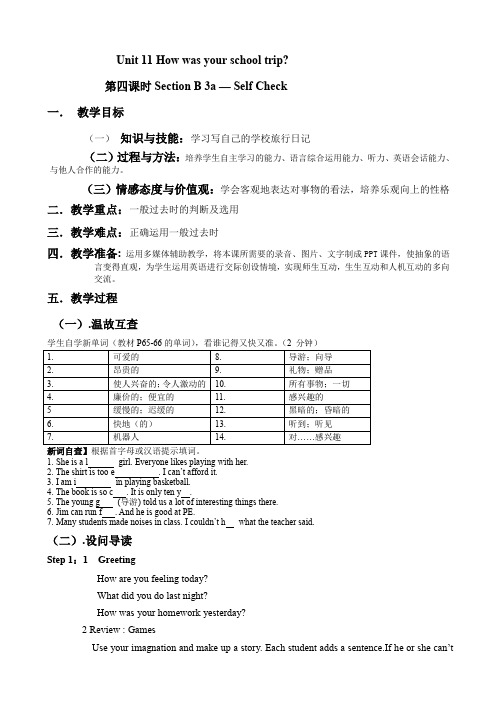
Unit 11 How was your school trip?第四课时Section B 3a — Self Check一.教学目标(一)知识与技能:学习写自己的学校旅行日记(二)过程与方法:培养学生自主学习的能力、语言综合运用能力、听力、英语会话能力、与他人合作的能力。
(三)情感态度与价值观:学会客观地表达对事物的看法,培养乐观向上的性格二.教学重点:一般过去时的判断及选用三.教学难点:正确运用一般过去时四.教学准备:运用多媒体辅助教学,将本课所需要的录音、图片、文字制成PPT课件,使抽象的语言变得直观,为学生运用英语进行交际创设情境,实现师生互动,生生互动和人机互动的多向交流。
五.教学过程(一).温故互查新词自查】根据首字母或汉语提示填词。
1. She is a l girl. Everyone likes playing with her.2. The shirt is too e. I can’t afford it.3. I am i in playing basketball.4. The book is so c . It is only ten y.5. The young g (导游) told us a lot of interesting things there.6. Jim can run f . And he is good at PE.7. Many students made noises in class. I couldn’t h what the teacher said.(二).设问导读Step 1:1 GreetingHow are you feeling today?What did you do last night?How was your homework yesterday?2 Review : GamesUse your imagnation and make up a story. Each student adds a sentence.If he or she can’tadd a sentence,he or she must sing an English song.Step 2 : Preparation1.3a Look a t the pictures of Bob’s school plete his diary entry.2. 3b Linda is Bob’s classmate. Complete her diary entry.Step 2 : Writing3c Now write a diary entry for your own school trip.Explain if you liked it or didn’t like it a nd why.Step 3 : Self-check1 Write more verbs and their past forms in each group.2 Complete the conversations with the correct forms of the verbs in the box.3 Check the answers4 Grammar: The Simple Past Tense(三)自我检测Mike’s summer vacationOn July 18th,2012, Mike and his parents went to Qingdao, a city in Shandong for summer vacation. Qingdao is a beautiful city with sea.It was about 12:00 when they arrived there on the first day. They found a hotel and had a short rest. It was really hot and they decided to go to the beach. At about 3:30 pm, they got to the beach. There were many people there. Some were lying on the beach and many children were playing in the water. Mike was playing with them and he was very happy. His parents also felt relaxed. About two hours later, they went back to the hotel.On the second day, it rained all day. Mike visited the history museum with his father and his mother went shopping.On July 20th, they went to Laoshan Mountain in the morning and took a bus home in the afternoon. They were tired but happy.( ) 1. Where did Mike’s family go on vacation? A. To Shanghai. B. To Tianjin.C. To Qingdao.( ) 2. What did Mike’s father do on July 19th?A. He swam in the sea.B. He visited the history museum.C. He went shopping with Mike’s mother.( ) 3.How long was their vacation? A. One day. B. Two days. C. Three days.( ) 4. How did they go back home? A. By train. B. By bus. C. By plane.( ) 5. Which of the following is true?A. It rained on July 19th.B. They went shopping on July 20th.C. Mike didn’t play in the water on the first day.(四).巩固训练:一、阅读理解。
2019-2020年人教版英语七年级下册Unit 11 How was your school tr
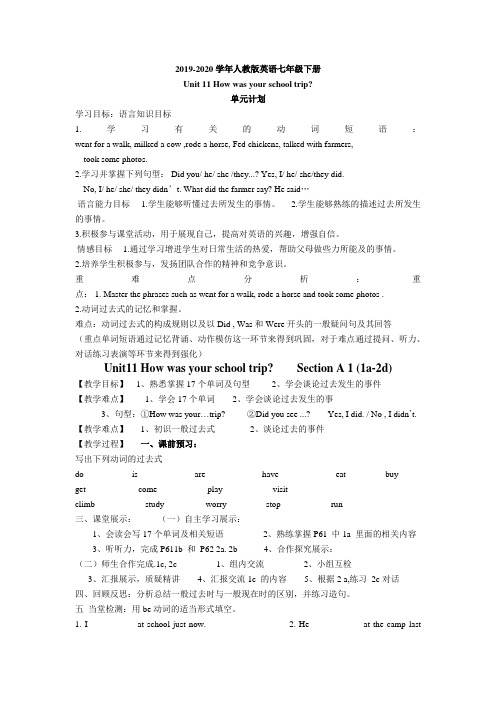
2019-2020学年人教版英语七年级下册Unit 11 How was your school trip?单元计划学习目标:语言知识目标1.学习有关的动词短语:went for a walk, milked a cow ,rode a horse, Fed chickens, talked with farmers,took some photos.2.学习并掌握下列句型: Did you/ he/ she /they...? Yes, I/ he/ she/they did.No, I/ he/ she/ they didn’t. What did the farmer say? He said…语言能力目标 1.学生能够听懂过去所发生的事情。
2.学生能够熟练的描述过去所发生的事情。
3.积极参与课堂活动,用于展现自己,提高对英语的兴趣,增强自信。
情感目标 1.通过学习增进学生对日常生活的热爱,帮助父母做些力所能及的事情。
2.培养学生积极参与,发扬团队合作的精神和竞争意识。
重难点分析:重点: 1. Master the phrases such as went for a walk, rode a horse and took some photos .2.动词过去式的记忆和掌握。
难点:动词过去式的构成规则以及以Did , Was 和 Were 开头的一般疑问句及其回答(重点单词短语通过记忆背诵、动作模仿这一环节来得到巩固,对于难点通过提问、听力、对话练习表演等环节来得到强化)Unit11 How was your school trip? Section A 1 (1a-2d)【教学目标】1、熟悉掌握17个单词及句型2、学会谈论过去发生的事件【教学难点】1、学会17个单词2、学会谈论过去发生的事3、句型:①How was your…trip? ②Did you see ...? Yes, I did. / No , I didn’t. 【教学难点】1、初识一般过去式2、谈论过去的事件【教学过程】一、课前预习:写出下列动词的过去式do______ is_______ are_______ have_______ eat____ buy_____ get______ come ______ play _____ visit______climb ______ study _____ worry_____ stop _____ run_____三、课堂展示:(一)自主学习展示:1、会读会写17个单词及相关短语2、熟练掌握P61 中1a 里面的相关内容3、听听力,完成P611b 和P62 2a. 2b4、合作探究展示:(二)师生合作完成.1c, 2c 1、组内交流2、小组互检3、汇报展示,质疑精讲4、汇报交流1c 的内容5、根据2 a,练习2c对话四、回顾反思:分析总结一般过去时与一般现在时的区别,并练习造句。
人教新目标(Go for it)版Unit 11 How was your school trip-
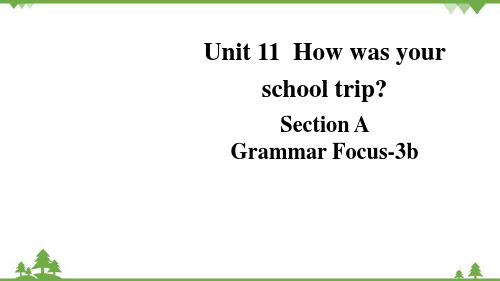
Irregular verbs
do is are have eat buy
did was were
had ate bought
定义 时间标志词
一般过去 时(一)
构成(动词的规则性和 不规则性变化) 句式结构
定义
一般过去时表示过去某个时间或某一段时间内发生 的动作或存在的状态,也可以表示过去的习惯或经 常发生的动作。一般过去时常和表示过去的时间状 语连用。
much fun.
A. have
B. had
C. are having
D. will have
Susan _____ a birthday card for me two days ago.
A. will buy
B. bought
C. buys
D. is buying
—_____ you _____ TV yesterday evening?
花
come out 意为“出现;露出”
We _a_t_e_ (eat) our 在lun含c有h 宾un语d从er句so的m主e 从tr复ee合s a句n中d , _p_l_a_y_e_d (play) some若g主am句e的s 时af态ter为t一ha般t.过B去ut时a,t a从bo句ut two o’clock, it _g_o_t通(g常et要) v用er相y应cl的ou过dy去a时n态d w。e _w_o_r_r_ie_d_ (worry) it would rain. Luckily, it _d_i_d_n_’_t
c.
或
后,-ed读
。如wanted,
needed.
⑤动词过去式的不规则变化规律:
类别
人教版英语七年级下册Unit_11_How__was_your_school_trip_?_Section__B
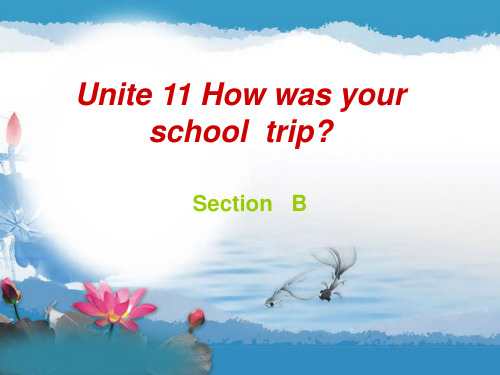
2c Complete the chart. How do Helen and
Jim describe these things?
Helen the trip the train Jim
1c Listen again. What did Jane and Tony
do on their last school trip? Check (√) Tony or Jane.
went to the countryside climbed went to saw some drew a an art paintings pictures mountain museum
watch flowers
watched flowers
pick strawberries picked strawberries
1a Match the activities with the pictures 1.go to the zoo __ 4. climb a mountain__ 2.visit a museum__ 5. visit a fire station__ 3.ride a horse__ 6.go fishing__
e
a
d
b
f
c
1a Match the activities with the pictures 1.go to the zoo _a_ 4. climb a mountain_e_ 2.visit a museum_c_ 5. visit a fire station_d_ 3.ride a horse_b_ 6.go fishing_f_
II. 译出下列短语 去散步 去购物 去钓鱼 挤奶牛 骑马 骑自行车 喂小鸡 和某人谈话 拍照
七年级英语下册Unit 11 How was your school trip SectionA Period 1(1a-2c)

1. ____ Did he see any cows on the farm? Yes, he did. 2. Did he milk a cow on the farm? No, he ______. didn’t 3. Were the strawberries good? Yes, they were 4. Did you see any cows? Yes, I did. I saw ___ quite a lot. 5. I ___ fed the chickens last week.
1a Match the phrases with the pictures. went for a walk e milked a cow b rode a horse a fed chickens c talked with a farmer f took some photos d
1b Listen and circle the three things Carol did on her school trip in 1a.
Learning aims:
• learn new words & phrases: • new sentences: (1)--- How was your school trip? --- It was great. (2)学会用 Did you ...? Yes,I did./ No,I didn't. 描述过去的事情。 Practice listening & speaking skills.
went for a walk milked a cow rode a horse fed chickens talked with a farmer took some photos
Unit_11_How_was_your_school_trip_Section_B_1a-2c

1a Match the activities with the pictures.
1. go to the zoo __ 2. visit a museum __ a c 3. ride a horse __ 4. climb a mountain __ b e 5. visit a fire station __ 6. go fishing __ d f
1c Listen again. What did Jane and Tony do on their last school trip? Check√ Tony or Jane.
went to climbed went to saw drew some pictures the a an art countryside mountain museum paint ings Tony Jane
选择填空 B 1. ____ Emily at her aunt’s last night? A. Is B. Was C. Did C 2. _____ he sleep late last night? A. Is B. Was C. Did 3. My mother _______ some cakes for us C last night. A. makes B. make C. made 4. — Did they take any photos? — _______. A A. No, they didn’t B. No, they did C. No, they aren’t
7. watch________ watched
I. 用适当的词填空
1. How was your school trip? It was great. ___ 2. How _____ you yesterday? were 3. Today is Monday. Yesterday ___ was Sunday. 4. What did you do the day before ___ yesterday? 5. ____ you ride a horse last week? Did
七年级英语下册_Unit11 第3课时 Section B 1a-1d(课时练习)-解析版

Unit 11 How was your school trip?Section B 1a-1d一、汉译英:单词/短语1.去乡下____________________2.爬山____________________3.参观博物馆____________________4.看见一些油画____________________5.画画____________________6.参观消防站____________________【答案】1.go to the countryside2.climb the mountain3.visit the museum4.see some oil paintings5.draw a picture6.visit a fire station【分析】1.去乡下:go to the countryside,固定短语,故填go to the countryside。
2.爬山:climb the mountain,固定短语,故填climb the mountain。
3.参观博物馆:visit the museum,固定短语,故填visit the museum。
4.看见一些油画:see some oil paintings,some修饰复数名词,故填see some oil paintings。
5.画画:draw a picture,固定短语,故填draw a picture。
6.参观消防站:visit a fire station,固定短语,故填visit a fire station。
二、单项选择7.Jenny ________ TV every evening. But last night she ________.A.watches; didn't B.watch; didn't C.watched; didn't D.watches; doesn't 【答案】A【详解】句意:Jenny 每天晚上都看电视。
初中英语人教版七年级下册《Unit 11 How was your school trip Sect

They weclohreveea_l_py_.___ and
terrJibimle's&idbeoaring
The train was _s_lo__w___. He's not _in_t_e__re__sted in robots.
New words
dark
dark作形容词,意为“黑暗的”,反义词为 bright,意为“光明的” 天快黑了。 It' s getting dark. [拓展]①dark作形容词,还可意为“(色彩)深 的”;反义词为 light,意为“(色彩)浅的” 我爱好深蓝色。 I like dark blue. ②dark作名词,意为“黑暗;暗处” 她在黑暗中什么也看不见。 She could see nothing in the dark.
Warm-up
S1. WhMS2. WhEenacdhidstyuoduegnot tahdedres?a sentence.
S3. How was the weather there?
S4. WhSohdaidreyyoouugroswtoitrhy.?
New words
fast
fast作副词,意为“快地” 反义词为slowly“慢地 这个男孩跑得快。 The boy runs fast. fast用作形容词,意为“快的” 反义词为slow“慢的 我们可以乘快车。 We can take a fast train.
New words
guide
guide可数名词,意为“导游;向导” 导游带我们参观了博物馆。 The guide showed us around the museum. [拓展] guide及物动词,意为“带领;引导” 她领着她的学生过马路。 She guided her students across the road.
人教版新目标七年级下Unit11 How was your school trip Section a1课件

play computer
played computer
What did you/he/she/they/Mr. Green do last weekend?
studied for the test
watched TV
did some reading
had a party
played tennis
3. 情态动词的一般过去时态 肯定句式:主语 + 情态动词的过去式 +v原型+ 其它. 否定句式:主语 + 情态动词的过去式 + not +v原型 + 其它. 一般疑问句:情态动词的过去式 + 主语 + v原型+ 其它? could , may→______, might 注:情态动词的过去式:can→_____ would ,shall-______ must ,will-______ should must→_____ 。 4.特殊疑问句式:特殊疑问词+ 一般疑问句? 1)特殊疑问词+was/were+主语+其他? 2)特殊疑问词+情态助动词过去式+主语+v.原形+其他? 3)特殊疑问词+did+主语+v.原形+其他? 1)Why ____ was ____he late for school last Monday? 他上周一为什么上学迟到了? do 2)What _____ could ______she ____twenty years ago? 20年前她能做什么? Where did go yesterday?昨天你去哪了? 3) _____ _____you_d time yesterday. 1. They ______ watch (not watch) TV last night. 2. They didn’t ___________ Did you _____ go (go) to the park yesterday? 3. ____ did / _____, No I didn’t. Yes, I____. 注意:1. did和didn’t 是构成一般过去时的助动词, 其特点是要在其后跟动词的原形。 2. 实意动词do的一般过去时 I do my homework every day.(用yesterday改写句子) did I ____my homework yesterday. didn’t do my homework yesterday.(否定句) I _________ do your homework yesterday? ____ you ____ Did Yes ,I did. /No, I didn’t.(一般疑问句)
Unit_11_How_was_your_school_trip_Section_B_3a--self_check

home, but tomorrow he is ______ (take) a taking
bus there.
按照要求完成句子, 每空一词。
1. Peter did his homework last night. (改为否 定句) didn’t do Peter ______ ______ his homework last night. 2. There were some children in the park just now.(变一般疑问句,并进行否定回答) Were any —_____ there ______ children in the park just now? there _______. —No, ______ weren’t
Unit 11 How was your school trip?
Section B
Period 2 (3a-Self Check)
翻译下列短语和句子。 1. 到达那儿 get there 2. 下棋 play chess play the piano play basketball
弹钢琴
打篮球
3. 对感兴趣 be interested in all in all 4. 总之
1 Write more verbs and their past forms in each group. climbclimbed
pick-picked milk-milked play-played stay-stayed want-wanted
arrivearrived
hope-hoped live-lived movemoved dancedanced
Unit 11 . How was your school tripSection B 2

2 Complete the conversations with the correct forms of the verbs in the box.
have do swim go be see feed 1. A: I went to the countryside this summer. B: Really? How ____ was the trip? A: It was ___ great! B: What ___ did you __ do there? A: I fed ___ the chickens and _____ swam in a river.
He took some photos and bought some gifts.
3a Look at the pictures of Bob’s school trip. Complete his diary entry.
June 23rd Yesterday my school visited the zoo. It was really interesting _________. We went there by bus. At the zoo, I saw a lot of _______ animals and I took some photos. My classmates and I also went to the ________ gift shop and bought some _____. gifts It was a great day.
hope-hoped worrylive-lived worried move-moved cry-cried dancedanced
stopstopped
人教七年级英语下《Unit11HowwasyourschooltripPeriod4》
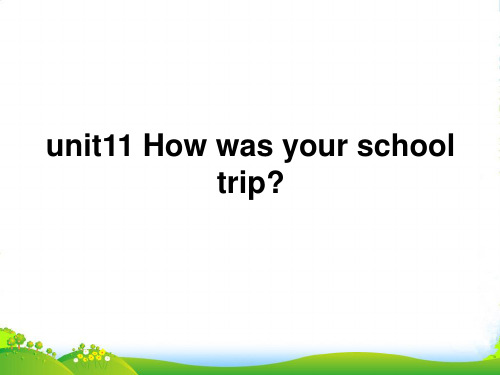
5. My father often
(swim)in this river when he was
young.
答案: 1. was 2. Were 3. visited 4. rode 5. swam
Ⅱ. 句型转换
1. She was a dancer 10 years ago. (改为否定句)
She
的消息时, 每个人激动不已。excited人感到兴奋, 修饰人;
exciting令人兴奋的, 指物体令人兴奋, 修饰物, 故选B。
【习作在线】 四练笔巩固--1师友练笔
请根据下表提示, 以“A Great School Trip”为题写一篇
英语短文, 介绍七年级一班去泰山(Mount Tai)校游的情况。
3. 昨天他参加了学校旅游。
He
a school trip yesterday.
4. 母亲教我如何做早饭。
My mother
me
cook breakfast.
5. 他一点也不喜欢这次旅行。
He
like the trip
.
答案: 3. went on 4. taught; how to 5. didn’t; at all
19. along the way 沿线
20. after that 之后 21. buy sth. for sb. 为某人买某物
22. all in all 总的来说 23. take a / the train 乘火车
一、知识回顾 ---2. 教师点评
【语法总结】一般过去时 (一)一般过去时的定义 一般过去时表示过去某个时间发生的动作或存在
→
(adv. )幸运地; 好运地
7. paint(v. )
Unit11 How was your school trip Section_A_
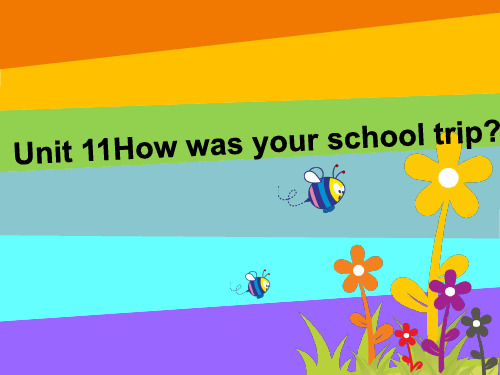
ate our lunch
played some games
2a Listen and check the questions you hear.
What did the farmer say? Did you grow any apples? √ What did you see? √ Do they grow apples? Did you learn anything? Did you eat them? √ Did you ask him any questions? √ Were they good?
相当多
quite a little +不可数名词
e.g. 1)We drank _q_u_i_t_e_a__l_oit_tl_oe_f__wine.我们喝了不少酒。
2) I saw _q_u_i_t_e_a__lf_oe_tw_o_f cows.我看到了相当多的奶牛。 3) I play tennis _q__u_it_e__a_l_o_t_in the summer.
【2011四川德阳】– Do you know who cleaned the blackboard, Tina?
-- Yes. John _____.
A. do
B. does
C. did
答案: C
【解析】本题考查时态的运用。擦黑板是已 经过去发生的动作。在回答时,也应用过去 时态,应排除A、B,故选C。
What did he do on the farm? He rode a horse. Did he ride a horse? Yes, he did.
Did he milk a cow? Yes, he did. He milked a cow.
- 1、下载文档前请自行甄别文档内容的完整性,平台不提供额外的编辑、内容补充、找答案等附加服务。
- 2、"仅部分预览"的文档,不可在线预览部分如存在完整性等问题,可反馈申请退款(可完整预览的文档不适用该条件!)。
- 3、如文档侵犯您的权益,请联系客服反馈,我们会尽快为您处理(人工客服工作时间:9:00-18:30)。
I think … was….
It was +adj.+ to do…
(3)语法:能使用be动词和实义动词的一般过去时描述过去发生的事情。
2.能力目标
(1)通过阅读课文,学生能够掌握一些阅读技巧,如predicting, skimming, scanning and searching for details, etc
学生两人一组做对话
PPT呈现对话主体内容,复习前面所学的一般过去时句式、相关活动词汇及描述性词语,为阅读扫清障碍。学生做对话时,用电子白板的书写功能板书学生用到的形容词。
Leading in
借助图片讲述自己的一次旅行,引出新词汇。
听老师讲述自己的旅行,看图片,识记新词汇。
边讲述边用PPT展示一张张精美的旅行照片,并利用PPT的文字缩放功能出示相关的短语和词汇,既能引发学生的好奇心,吸引学生的注意力,又形象直观的学习了新词汇,寓教于乐。为后续教学打下基础。
(2)通过本课的学习,能运用一般过去时有条理的将自己过去所经历的事情写成日记。
3.情感目标
学会用过去时态进行回忆;学会用英语褒义词和贬义词进行描述;并体会以积极乐观的心态去看待人、事或物。
四、教学环境
□简易多媒体教学环境□交互式多媒体教学环境□网络多媒体环境教学环境□移动学习□其他
五、信息技术应用思路(突出三个方面:使用哪些技术?在哪些教学环节如何使用这些技术?使用这些技术的预期效果是?)200字
再读日记,思考讨论问题。
引导学生对文本话题情感升华拓展进行探讨,让学生真正体会到要以积极乐观的心态去看待人和事。
3a and 3b
让学生看3a图片并回答问题,完成Bob和Linda的日记,核对答案,帮助他们总结归纳如何写一篇旅行日记。
观察、比较、补全日记,总结旅行日记的写作要点。
利用电子白板的拖拽功能帮学生归纳总结旅行日记应该包含的要点,培养学生写出更有条理性的文章。
本节课是读写课,我主要运用任务型教学法及情景交际法,在多个教学环节采用交互式多媒体课件进行辅助教学。如复习导入、读前词汇学习、读中、读后和写作等环节,主要借助PPT为学生呈现对话、图片、问题、表格等内容,形象直观、脉络清晰地帮助学生理解、感知所学内容,在读中还穿插播放课文录音,让学生模仿录音跟读课文,有助学生校对音准、语调及长句的断句,达到更好的阅读效果,写作后利用投影仪对比、学习写作成果,更直观、有效地检验学生学习效果。在各教学环节中注重交互式电子白板的各项功能的利用,如书写、拖拽、勾画、幕布、刮奖刷等功能,较好的发挥师生的互动,让学生从单一的听课,转为积极主动地参与课堂,提高学习兴趣,改善课堂效率。
Writing
要求学生依据写作要点写一篇旅行日记。
根据要点写旅行日记。
PPT呈现旅行日记要点,降低写作难度,让学生有了写作的依据和思路。
Check diary
展示几篇学生写作,与学生共同批阅。
相互批阅,找出好词好句和错误。
用实物投影仪展示日记,利用屏幕批注功能标注学生找出的好词好句或错误,更直观有效的帮助学生写好作文。
自主完成作业
通过互相批阅和针对习题,让学生对本课的重点内容进行复习巩固,加深记忆。
七、教学特色(如为个性化教学所做的调整,为自主学习所做的支持、对学生能力的培养的设计,教与学方式的创新等)200字左右
本节课一节读写课,要求学生在阅读完两篇有关学校旅行日记之后,能 够结合自己的实际情况,运用动词的过去式来描述自己的一次学校旅行,并会运用本课中的描述性形容词、词汇、句型等来进行写作。依据教学目标,我在教学设计 过程中从复习、导入、新课的教学、写作等一系列的设计都紧紧的围绕本课的重点来进行,并将其贯穿始终,做到了重点突出。各种教学活动把听、说、读、写训练 有利的结合,由易到难,由浅入深,提高了学生的学习兴趣,充分体现了学生的主体作用。本课在阅读教学中注重对学生阅读技巧的指导,如从泛读到精读再到对课 文重点进行复述,使学生掌握了一定的阅读技巧,达到了本节课的教学目的。同时注重对学生基本技能的培养,并且利用交互式多媒体的书写、幕布、刮奖刷、拖 拽、音视频播放等功能辅助各教学环节,使学生听、说、读、写的能力得到全面提高的同时,极大地激发学生主动、积极地参与课堂的兴趣和意识,达到初步运用英 语进行交际的目的。
二、学生分析
七年级下学期的学生经过半年多的学习,有了一定的英语基础知识和听说能力,正逐渐向读、写过渡。通过SectionA及SectionB第 一课时的学习,学生已经初步认识一般过去时的一般疑问句、肯否定陈述句等句式,也掌握更多动词的规则及不规则过去式,在这一基础上进行读写教学,可让学生 进一步感悟体会怎样运用一般过去时对过去某一事情进行描述,但是,在英语学习中也存在着一些问题,比如,词汇量比较少,动词过去式使用不正确,而且,学生 习惯用中文思维,不知道怎样用英语确切、流畅的表达自己的思想。因此,在本课教学过程中,在注重启发引导,培养学生分析、概括能力的同时,更要注重教学方 法的灵活性,通过任务型教学法,情景交际法,多媒体辅助教学等,激发学生学习的兴趣,让学生乐于接受,易于接受。
三、教学目标
1.知识目标
(1)话题:School trips.
(2)词汇:exciting, lovely, expensive, cheap, slow, fast, robot, guide, gift, everything, dark, hear, along the way, play chess, learn a lot, all in all, be interested in, not…at all
看图片和问题,速读课文,回答问题。
PPT呈现课文图片和问题,核对答案。以简单问题引领,快速浏览文章,注意文章首尾抓关键词、主题句,能有效锻炼学生对语言的归纳提炼能力并快速的了解文章的主旨。
Careful reading
细读两篇日记,阅读的过程中把握细节问题,以加强对描述性词汇的理解和感悟,组内合作,共同讨论,完成表格。
细读课文,组内合作讨论,完成表格
PPT呈现表格。让学生带着疑问why did they feel differently?细读课文,完成表格,利用电子白板的书写功能核对答案,通过对比,加深对两篇日记的理解。
listen and read
播放文章录音,让学生认真听、跟读、正音。
听课文录音、跟读,大声朗读课文,注意语音语调。
Pre-read
教授朗读新单词:exciting, expensive, cheap, fast, slow,lovely.让学生小组讨论区分2a中的形容词。
组内讨论,区分形容词,完成2a。
PPT呈现2a的形容词,用红色字体重点标注生词。让学生以组内讨论形式区分褒义、贬义或中性的形容词,为语篇的理解做好铺垫。让学生上前利用电子白板的拖拽移动功能完成2a。此环节学生由单一的听课,转为主动的投入和积极的参与,加固了对词语的理解。
教学设计
教学主题
Unit11 How was your school trip? Section B 2a---3c
一、教材分析
本单元以“学校旅行”为主题,以同学之间谈论各自的游览经历为背景,展开多种形式的语言训练活动,目的是让学生逐步学会运用一般过去时态叙述和询问过去的活动经历。本课2a至2c是 阅读教学部分,该部分先让学生熟悉一些描述性的形容词,分辨它们带有褒义还是贬义,然后让学生阅读两篇关于学校旅行的日记,找出日记中的描述性形容词,并 通过对比来总结两位作者关于同一旅行经历的不同态度,不仅考查学生对篇章的理解和培养阅读策略,还训练学生对比分析能力。3a至3c是写作部分,通过提供句子框架和图片提示完成日记内容并描述自己经历的学校旅行,这一任务不仅能让学生有意识地运用目标语言进行输出,同时还启发了学生从所学的阅读篇章中吸取供模仿的写作的句型和表达,进而提高自己的语言表达能力。
Understand the sentences and useful expressions.
呈现重难点句型,让学生组内讨论,教师适当点拨,出示巩固练习。
小组讨论,释疑解惑并完成练习巩固。
PPT呈现重难点句型。利用电子白板的勾画功能标出语言点,让学生以小组讨论交流的形式去理解,为下面的语言输出做准备。巩固练习环节利用电子白板的刮奖刷功能出示答案,能激发学生主动参与意识和兴趣。
While-read
Fast reading
呈现教材中的插图,让学生根据图片信息猜测:Where is Helen?让学生速读回答下列问题,提醒学生注意首尾关键句:Where did they visit? Did they go on the same trip?
How do they feel about the trip?”
Summary
帮助学生总结归纳本节课所学内容。.
学生总结、归纳所学。
利用电子白板的幕布功能出示所学要点,引导学生总结、归纳所学内容,提高参与兴趣。
Homework
Correct your own diary and help to correct other’s.
Read 2b.
Finish off Tong Bu P119Ⅳ&Ⅴ.
六、教学流程设计(可加行)
教学环节
(如:导入、讲授、复习、训练、实验、研讨、探究、评价、建构)
教师活动
学生活动
信息技术支持(资源、方法、手段等)
Warming up
播放一段有关学校旅行的微视频
观看视频
充分利用PPT丰富的媒体支持功能,播放一小段微视频。利用多媒体的音效和图像功能,为学生创设直观情境,自然导入学习话题。
用下列问题询问学生,让学生以此做对话。
A: How was your last school trip?
B: It was…
A: Did you …?
